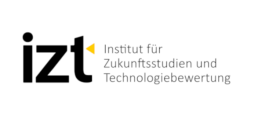UfU Information | Issue 5 – June 2022 | Department of Environmental Law & Participation
Data and its significance for environmental and climate protection
The new approach to regulating data in Berlin
Digitalization and the socio-ecological transformation of society are the two megatrends of the present.
There are hardly any areas into which digitalization has not yet penetrated. New applications, economic activity and even society itself can no longer do without data and its processing.
The same applies to the socio-ecological transformation. Hardly any sector of our economy can afford not to think about planetary boundaries, climate protection and the impact of its own business activities. Hardly any area of our social life will be able to exist in the future without any change in terms of sustainability.
These megatrends may be good or bad, they may even generate uncertainty and skepticism, and there are understandable reasons for these reactions. Regardless of how you view digitalization or the transformation of our economy and society, the fact is that both trends are here to stay and will intensify in the coming years. This gives rise to important tasks for us as a society in terms of climate and environmental protection, but also with regard to participation, democracy and power relations.
In the Ecornet project “Data governance and regulation for a sustainable Berlin”, UfU is therefore working together with the Öko-Institutthe Institute for Futures Studies and Technology Assessment (IZT) and the Ecologic Institute The question of how access to and use of data in Berlin can be controlled and regulated in the interests of sustainability.
Data can have both positive and negative effects on climate neutrality and sustainability
Why are we dealing with the topic of data and digitalization? In order to build a sustainable and climate-neutral society, it will be crucial in the future to put digitalization at the service of sustainability. Digital innovations have the potential to strengthen environmental and climate protection (e.g. through intelligent traffic guidance systems) but also to act as a fire accelerator by further fueling climate-damaging behavior.
One example: data is the raw material of digitalization and the basis for the development of digital applications. Whether the potential of digitalization for socio-ecological transformation can be realized therefore depends not least on who has access to which data and for what purposes. For example, it makes a considerable difference whether consumption data (e.g. on water or electricity) is used to achieve profit-maximizing pricing or to develop strategies to reduce consumption.
Another example is health data. On the basis of this sensitive information, both social inequalities and environmental pollution that is harmful to health can be combated in a targeted manner. At the same time, however, insurance companies could use this data to adjust insurance rates negatively for those who are exposed to greater burdens and therefore also risks.
Against this background, UfU and its partner institutes have examined the use of data in terms of sustainability and formulated specific recommendations for action for the state of Berlin. These recommendations should make it easier for the country to regulate data in the future, create institutions for handling data and enable the population to have greater data sovereignty over their own data.
The importance of data: Who may and can do what with you
The project initially developed so-called data principles, which can serve as guidelines for policymakers on how data should be handled and regulated in the future. The data principles developed are:
- Individual and public data sovereignty
- State responsibility for data
- Data transparency
- Data solidarity
- Data sufficiency
The idea of allowing citizens to decide how their data is used in future seems particularly promising. This is because much of the data that companies work with is generated by citizens, who currently have no effective say in the further use of their data.
Initial experience shows that this could be a major advantage for sustainable digitalization. Many people are willing to make their data available for public welfare purposes, as the coronavirus crisis has shown with the “data donation app”, for example.
The various recommendations for action
Based on the results of our research, we then formulated specific recommendations for the state of Berlin on how to handle data in the future. To this end, we engaged in an intensive exchange with practitioners from the health, mobility, circular economy and municipal infrastructure sectors. In each of these sectors, a half-day workshop was held in which the results and ideas of the project team were presented and discussed on the basis of a practical application.
UfU was responsible for the health sector and discussed the Berlin Environmental Justice Atlas with participants from the Senate, business and civil society, which includes health-related environmental pollution in the city.
1. make data available to the city
As described above, data today are raw materials for innovation and good business practices and have great potential to be used in the interests of sustainability. This benefit gives rise to the requirement that the federal states should have access to the data that has a particular public (sustainability) benefit for the federal state when tendering and awarding contracts for services.
2. build capacities and infrastructure
The establishment of a certain data infrastructure was named as a further recommendation for action. In order to be able to process the data that the federal states are to receive in the future and use it for regulation, it is advisable to develop specific competencies and structures within the administration. It would be conceivable, for example, to set up a Berlin data agency, which could have the task of coordinating the Berlin authorities and channeling the flow of data between various players (citizens, companies, associations, administration) in a way that is compatible with the common good.
3. set up a data trustee
Based on the results of the research on the voluntary donation of data for charitable purposes, a further recommendation for action was formulated: The establishment of a data trustee to manage data in the interests of citizens*. This is intended to give citizens better control over which of their data may be used for which purposes. Data trustees could be various institutions that are oriented towards the common good and have no profit motives. One possibility, for example, would be for citizens to use an app to send their data for a specific purpose to the data trustees, who would then manage and pass on the data for a specific purpose.
The second phase of the project will focus on developing the principle of data trustees in collaboration with practitioners. To this end, legal, organizational and technical issues are examined and developed in a transdisciplinary process with partners from the field. We hope that we will soon be able to present a concrete model for a data trustee concept.
The project is one of the first to combine data regulation and sustainability. It is important to recognize and regulate the environmentally harmful but also useful potential of data at an early stage. In this way, the data can consciously serve sustainable innovations and does not become an aid for existing problems.






